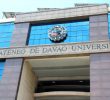DAVAO CITY, Philippines — Another school year is set to open next week, but public schools were expected to struggle with same “age-old problems”.
The Davao City National High School (DCNHS), for example, reported a good turnout of parents’ participation in the Brigada Eskwela, a pre-opening activity to repair and prepare the school buildings and the classrooms. But Jed Bete, the school’s media officer admitted they would encounter “perennial” problems during the opening of classes.
The DCNHS, the largest public school in Davao City, had to deal with the lack of classrooms.
The DCNHS has an average of 13,000 student population, both in junior and senior high, last school year. The growing number of students is beyond the capacity of the school’s current number of classrooms, Bete said.
The school is still waiting for additional school buildings to be constructed. To temporarily address the problem, several students have to cram in a classroom, more than the ideal class size conducive to learning.
“Our teachers here have to handle 60 to 70 students in a class,” Bete said.
Classrooms also lack tables and chairs. Bete said that teachers and parents had to repair those that were already old and damaged just to provide for the children.
The Alliance of Concerned Teachers (ACT) said it also received reports of shortages of classrooms and facilities from other schools. It said many schools currently operate on shifting schedules and 50-70 class size.
ACT said that teachers and students continue to suffer these problems due to shortages in facilities, learning resources, and teaching and non-teaching personnel.
“We are about to enter yet another school year, but teachers from 15 regions report of the same old problems plaguing their schools, ” ACT Secretary General Raymond Basilio said.
According to Basilio, students and teachers are cramped in makeshift classrooms in some schools, cases where classes are held in comfort rooms-turned-classrooms, in covered courts, by the stairs, and ‘under the trees’.
The ACT also documented cases of teachers not provided with faculty rooms.
Also, deficit in learning resources from elementary to senior high, and instructional materials for K to 12 students were documented by the group.
“Almost all 15 regions reported that teachers, especially those in SHS, are only provided curriculum guides. They themselves have to research on it as many are not trained to teach SHS but are nonetheless obliged to do so,” Basilio said.
He added that teachers still had to print and reproduce needed materials because their school’s MOOE (Maintenance and Other Operating Expenses) can’t cover these expenses.
ACT also reported that some teachers have been tasked by their schools to solicit from their co-teachers and other stakeholders, to be able to buy equipments for their schools.
The group urged the government to prioritize the immediate resolution to these age-old problems and shortages in the education system of the country.
“We must remember that teachers working conditions are students’ learning conditions,” Basilio said.
On top of the issues raised by public school teachers was their low salary, according to ACT.
“Teachers who are made to bear the state neglect of education in the country are among the lowest paid in professionals in the Philippines. The teachers’ service is bound to suffer when they living on a hand-to-mouth basis,” Basilio said.
The group further slammed the teachers’ overworked and underpaid condition
Dr. Teresita Del Valle, schools governance and operations division chief of the Department of Education-Davao City Division (DepEd), told Davao Today, there were still some schools dealing with the shortage of classrooms and school furniture due to the “rapid” increase of student population every year.
But she said the construction of additional classrooms was underway. “Every year, we submit a list to the [DepEd] central office to the number of additional classrooms we needed,” Del Valle said.
Del Valle noted that only few schools in the city are still implementing two shifts of class in a day.
Meanwhile, DepEd is opening several items for public school teachers.
DepEd, Del Valle emphasized, is doing its best to address the needs of the public schools.
“Our secretary of education is trying to solve these shortages. Every year we have the budget on what to repair or put up. There will come a time that all of these will be resolved,” Del Valle said.
Opening of classes in public schools across the country is scheduled on Monday, June 3. (davaotoday.com)










